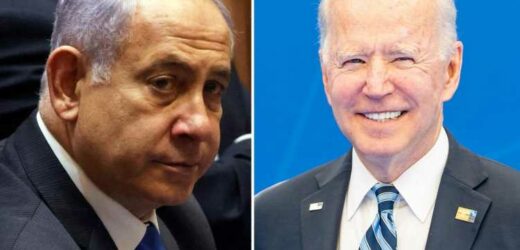BENJAMIN Netanyahu used his final speech as Israeli Prime Minister to take a swipe at Joe Biden's hopes to revive the nuclear deal with Iran.
Naftali Bennett is the country's new leader after the parliament yesterday narrowly voted in favour of ending Netanyahu's historic 12-year rule.
Vowing to return to office, Netanyahu went on to talk about dealing with Biden's White House saying "the administration" had asked him "not to discuss our disagreement on Iran publicly."
"But with all due respect, I can’t do that," Netanyahu then added, according to the Jerusalem Post.
"The prime minister of Israel needs to be able to say no to the president of the United States on issues that threaten our existence," he said.
Netanyahu also described his replacement as PM – once an ally – as a political lightweight lacking the talent to handle the big job.
Bennett does not have “the international stature, the knowledge, the government or the public’s trust to be taken seriously when fighting the Iranian threat,” he said.
The Post said Netanyahu compared the bid by the U.S. to return to the Iran deal to the decision by President Franklin D. Roosevelt not to bomb the train tracks leading to Auschwitz when there was an opportunity in 1944.
The speech was supposed to take 15 minutes but is said to have continued for more than a half-hour.
A senior Israelidiplomat later told Axios that Netanyahu "decided to damage the U.S.-Israel relationship for his own personal interests and is trying to leave scorched earth for the incoming government."
Netanyahu added Tehran is now "celebrating" hisdefeat as "they understand that starting today there will be a weak and unstable government."
Bennett will now preside over a diverse and fragile coalition of eight parties, however Netanyahu remains head of the Likud party and will hold the post of opposition leader.
Sunday's vote, passed by a 60-59 margin, ended a two-year cycle of political paralysis in which the country held four elections.
The seismic political development comes in the tense aftermath of an 11-day war between Israel and Palestine after clashes in Jerusalem sparked a bombing blitz that killed more than 250 people.
The fighting, as well as violence in the occupied West Bank and in mixed Jewish-Arab Israeli towns, initially appeared to strengthen Netanyahu's grip on power.
Netanyahu has made his feelings over US hopes to rekindle talks with Tehran crystal clear.
Just last month he said: "I can tell you that I hope that the United States will not go back to the old JCPOA (Joint Comprehensive Plan of Action) because we believe that that deal paves the way for Iran to have an arsenal of nuclear weapons with international legitimacy," Netanyahu said.
"We also reiterated that whatever happens, Israel will always reserve the right to defend itself against a regime committed to our destruction, committed to getting the weapons of mass destruction for that end."
What was the 2015 Iran nuclear agreement?
BROKERED by the Obama White House and signed by seven world powers, the Iran nuclear deal aimed to reduce the country's ability to produce nuclear weapons.
However, Donald Trump withdrew the US from the deal last year – branding it "horrible" and "one-sided".
Iran has also pledged to breach the agreement until it receives the sanctions relief it says it is owed.
The deal was an agreement between the Islamic Republic and a group of world powers aimed at scrapping the Middle Eastern country's nuclear weapons programme.
It saw Iran agree to eliminate its stockpile of medium-enriched uranium by 98 per cent.
Enriched uranium is a critical component for making nuclear weapons and in nuclear power stations and by curbing the amount Iran produce is a way to curb the number of weapons produced.
As part of the agreement, Iran also agreed to only enrich their uranium up to 3.67 per cent over the next 15 years and they agreed to reduce their gas centrifuges for 13 years.
Gas centrifuges are used to separate different types of uranium which allows specific types to then be used to manufacture nuclear weapons or generators.
Iranian nuclear facilities were limited to a single facility with only first-generation centrifuges for 10 years and other nuclear facilities had to be converted into other use.
In addition, they were barred from building any more heavy-water faculties – a type of nuclear reactor which uses heavy water (deuterium oxide) as a coolant to maintain temperatures in the reactor.
Also under the agreement, the International Atomic Energy Agency was granted regular access to all Iranian nuclear facilities to ensure Iran maintains the deal.
If Iran abided by the deal it was promised relief from the US, European Union, and the United Nations Security Council on all nuclear-related economic sanctions.
The agreement was reached on July 14, 2015, and the world powers signed it in Vienna.
Washington and Tehran are currently engaged in indirect negotiations in Vienna to return to the JCPOA, which sought to limit Iran’s ability to develop a nuclear weapon.
Donald Trump left the deal in 2018 and put massive sanctions on Iran, which Tehran demands Washington lift in exchange for their return to compliance.
Last month we reported how Iran is enriching enough uranium to make make nuclear bombs, the head of the UN's nuclear watchdog has warned.
Under the 2015 nuclear deal, Iran agreed to limit uranium enrichment to 3.67 per cent.
However, Rafael Grossi, director general of the International Atomic Energy Agency (IAEA) said the Islamic State is enriching uranium purity levels "only countries making bombs are reaching."
"A country enriching at 60 per cent is a very serious thing" he told the Financial Times.
"Sixty percent is almost weapons grade, commercial enrichment is 2, 3 [percent].
"This is a degree that requires a vigilant eye."
The JCPOA was designed to prevent Iran from developing a nuclear weapon in exchange for sanctions relief.
Under the agreement, the IAEA was granted regular access to all Iranian nuclear facilities to ensure Iran maintains the deal.
Israel’s main criticisms of the deal are that the restrictions on the Islamic Republic’s nuclear program expire in 2030, and that it does not limit its regional aggression, including proxy warfare.
Source: Read Full Article






